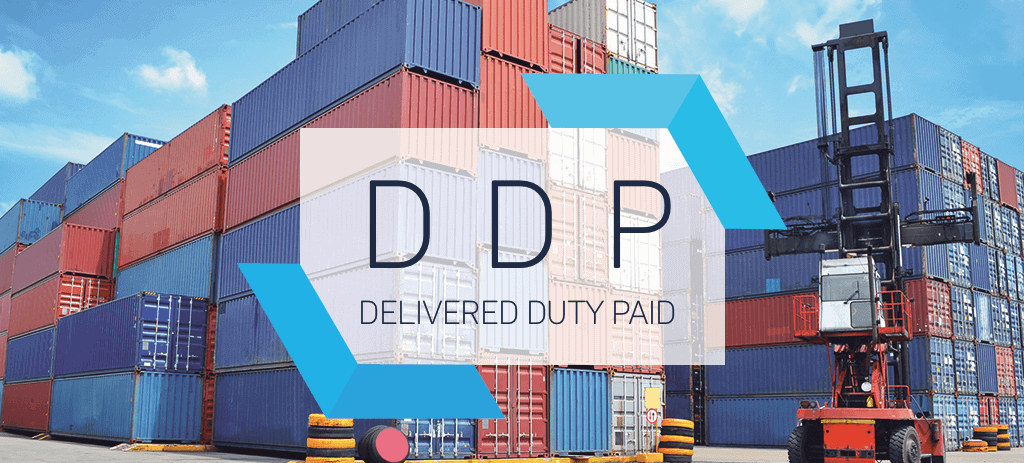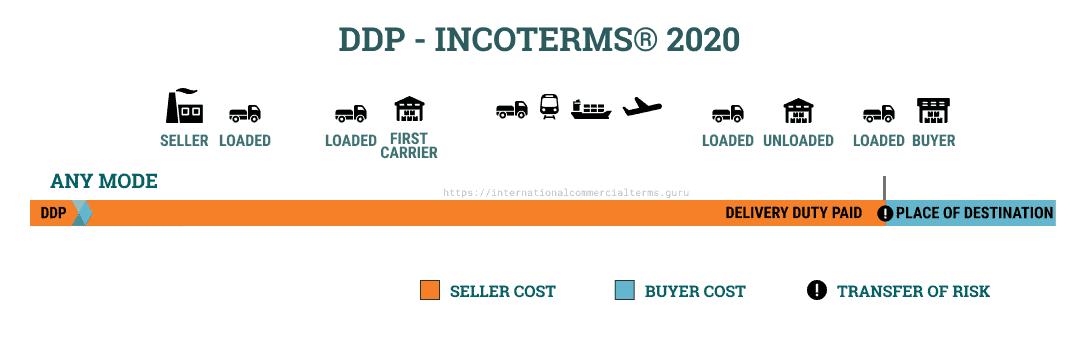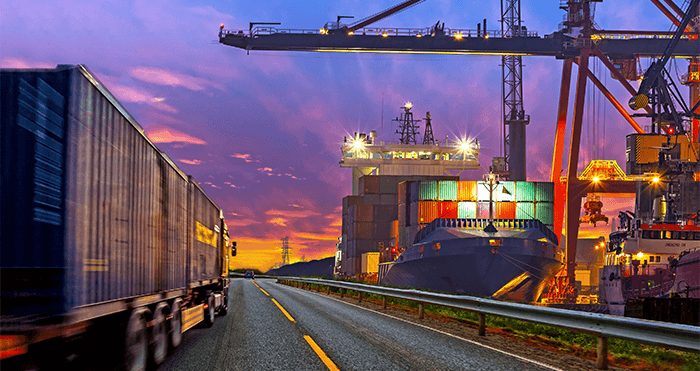What is incoterm DDP? Everything you need to know

If you’ve ever shipped goods internationally, you must have come across the Incoterm DDP. DDP is widely regarded as the most buyer-friendly incoterm, and many businesses and importers choose it for their B2B shipping transactions.
But what does this incoterm mean, and how do you use it? Relax. We’ll break down every aspect of the DDP incoterm for you in this guide. We’ll explain the roles of both buyers and sellers and analyze the pros and cons so you can make better-informed shipping decisions. Let’s begin!
What is Delivered Duty Paid (DDP) Incoterm?
Delivered Duty Paid (DDP) is an international trade term that places the seller in charge of all the shipping responsibilities, from start to finish. It stipulates that the seller is responsible for delivering the goods to the buyer’s named destination, bearing all the risks of the goods, and covering all costs, including export and import duties, taxes, and customs clearance. The seller’s job ends only when the goods are “delivered and ready for unloading” at the buyer’s destination, usually the buyer’s warehouse or the destination port.
In simple terms, DDP means that the seller takes on the maximum risks and responsibility for the goods until the buyer picks them up. This makes it a popular Incoterm for buyers who want simplicity and a predictable cost structure in international trade. Novice buyers who are unfamiliar with the shipping process are always drawn to the DDP Incoterm. Sellers who prioritize providing excellent customer service are also more likely to use this incoterm.
The seller is not obligated to buy insurance in a DDP agreement, but they usually do so to protect themselves because they bear significant responsibilities under this Incoterm. DDP is the most comprehensive incoterm in terms of seller obligations, as it is the only incoterm that requires the seller to handle both export and import clearance. This can be a problem for the seller because import clearance procedures in some countries are complex and are best left to the buyer, who is familiar with the local customs.

What are the responsibilities of Buyers and Sellers in DDP?
Seller’s Responsibilities:
- Package goods for shipping.
- Transports goods to the port of origin and loads them on the ship
- Obtains necessary export licenses, handles export clearance, and pays export duties.
- Pays freight charges and other shipping costs.
- Obtains necessary import licenses, handles import clearance, and pays import duties.
- Inland transportation of the goods to the buyer’s final destination.
- Bears the risk of loss or damage to goods during transit.
- Provides necessary shipping documentation to the buyer
Buyer’s Responsibilities:
- Pays for the goods according to the seller’s invoice.
- Provides any necessary document required by the seller for export or import clearance
- Unloads the goods at the final destination
- Bears all risks After Delivery
As you can see, you don’t need to worry about any additional costs or responsibilities after you pay for the goods. You just wait to receive the goods at your warehouse.

When does risk transfer to the buyer in a DDP agreement?
The risk transfers to you once the seller delivers the goods to your destination. From that point onwards, you become responsible for any damages to the goods.
When should I consider using DDP?
Some scenarios can make this incoterm favorable for you. Consider using DDP when:
- You’re inexperienced with international shipping and clearing customs.
- You do not have an import license for shipping into your country.
- Your seller has experience and a track record of shipping goods into your country.
- You’re working with a trusted and reputable freight forwarder like Winsky.
- You’re shipping low-value goods, product samples, or replacement parts.
- You prioritize knowing the entire shipping budget beforehand, with no surprises.
- Delivery to your destination requires multimodal transportation, e.g., Rail+Air+Truck freight.
Advantages of DDP for the buyer
DDP offers great value to buyers by minimizing risk, liability, and unforeseen costs. The key benefits include:
- Simplified cost budgeting: DDP operates a transparent shipping arrangement. The seller gives you the total cost upfront, which covers the product price, shipping fees, customs duties, and taxes. Beyond that, you’re not responsible for any unexpected expenses or charges that occur during the shipping and delivery process, which makes it easy to plan your budget.
- Reduced paperwork: You’re relieved from handling customs clearance or complex paperwork, as the seller shoulders such responsibilities.
- Convenience: DDP offers you a stress-free experience. All you do is wait for your goods to be delivered.
- Low risk: A DDP agreement minimizes potential financial losses and gives you peace of mind because you are not liable for any damage, loss, or delays until the goods arrive at your location.
- Easy multimodal shipping: DDP makes it simple to combine multiple modes of transportation for deliveries. Your supplier can combine ocean, air, or rail freight with road freight to create an efficient shipping process.
- Time Savings: DDP can save you valuable business time while the seller handles the logistics.
Disadvantages of DDP for the buyer
Most importers think DDP is only disadvantageous for the seller because of the risk and stress involved in handling the goods. However, DDP also comes with its share of drawbacks for the buyer. Here are the major ones:
- Higher Overall Cost: DDP tends to be the most expensive shipping term because the seller factors all possible associated costs into the upfront price, regardless of whether they actually incur them or not. In a DDP agreement, you’re most likely paying a price much higher than if you had handled shipping yourself.
- Limited Control: Buyers have less control over the specific costs involved in shipping, which makes it difficult to negotiate with agents to reduce prices for your benefit. As the seller handles the entire process, you have less control over the chosen transportation method, customs broker, insurance coverage, or delivery times. Sellers may decide to choose the slowest shipping option to save costs, which becomes a problem when you need your goods urgently.
- Cheating sellers: Some sellers may inflate shipping costs to make higher profits in a DDP arrangement. Because the seller is always looking for ways to save money, they might choose less reliable shipping methods that lead to late shipments, cargo loss, or goods being seized by customs.
- Difficulty in getting VAT refunds: In DDP shipping, sellers use their details for customs clearance, which means you won’t possess import documents for your shipment. This becomes a problem if you qualify for a tax refund in your country, as you won’t have the necessary paperwork to apply. For instance, countries like the USA offer local importers a tax refund of up to 20%, a benefit not available to foreign importers.
- Over-reliance on seller’s expertise: The success of the DDP transaction heavily depends on the seller’s knowledge of import regulations, customs procedures, and potential risks. Remember that any delays the seller faces during customs clearance or transportation directly affect you too. You might not be able to fully verify the seller’s expertise in shipping goods to your country, and mistakes can lead to clearance disasters and unforeseen costs that can even make the seller decide to abandon the cargo, which would also be a loss for you.
- Difficulty in tracking goods: DDP makes it difficult to monitor your shipment’s status. You can only depend on the seller for information, and any problem with communication means you don’t know the whereabouts of your goods.
DDP modes of shipping- Sea, Air, Rail, Express, and Road.

Delivering goods to our clients as soon as possible is our priority. Winsky Freight offers customers a combination of different modes of DDP shipping to deliver goods to our clients, whichever country they are in.
- DDP Sea Freight- Winsky delivers your goods in about 25 working days.
- DDP Air Freight– Winsky delivers your goods in 10-15
- DDP Rail Freight- Winsky delivers your goods in 28-35
- DDP Amazon FBA– Winsky delivers your goods as soon as you need them.
- Door-to-door shipping– We deliver right to your doorstep.
Best Alternatives to DDP
DDP Shipping vs. DAP Shipping
DAP (Delivered at Place) shares many similarities to DDP shipping. Under both incoterms, the seller is responsible for shipping the goods to the destination country. However, in the DAP incoterm, the buyer is responsible for import customs clearance and taxes, whereas the seller goes all the way in the DDP incoterm.
DDP Shipping vs. FOB Shipping
Free on Board (FOB) is another widely used incoterm. Under this arrangement, the seller’s obligations end when they load the cargo on the ship. After that, you oversee the goods’ transportation until they reach the destination port, manage import customs clearance, and transport them to the final destination. As you can see, a buyer has far more responsibilities in FOB shipping than in DDP, where the seller does all of the work.
DDP Shipping vs. EXW Shipping
Ex-Works (EXW) is the direct opposite of DDP shipping. In DDP, the seller handles every aspect of shipping; in EXW, the buyer is responsible for handling everything. You basically pick up the goods from the seller’s warehouse and handle the entire shipping process in EXW, in contrast to DDP, where the seller ships the goods directly to your door. EXW is the cheapest incoterm because you only pay for the price of your goods.
FAQs
Who pays for customs duties in a DDP arrangement?
The seller pays both export and import customs duties in a DDP arrangement.
Can I use DDP when importing from China?
Absolutely! DDP is a very popular incoterm used by many importers and businesses sourcing goods from China. Contact Winsky Freight to streamline your importation process.
When does the buyer pay the seller in DDP shipping?
This depends on the agreement between both parties. Some sellers may prefer to receive a deposit before shipping and be paid in full when the goods are delivered, while others may prefer to be paid in full when the goods are aboard the shipping vessel. Still, other sellers may be comfortable delivering the goods before requesting payment.
Which shipping method is best for DDP shipping from China?
Any shipping method can be used in a DDP agreement, whether air, sea, rail freight, or a combination of them (multimodal shipping).
Conclusion
DDP is the most-buyer-friendly incoterm because it is straightforward and convenient for the buyer. For all the comfort of DDP shipping, however, it poses many risks, especially if the seller lacks sufficient shipping knowledge. It is advisable to only use quality sellers or leave the entire process in the hands of a trusted freight forwarder like Winsky Freight.
We have extensive knowledge and expertise in DDP shipping from China to Amazon FBA in the USA, Canada, the UK, Germany, Italy, and other European countries. With our international team of agents and freight forwarders, we will help you handle the customs clearance process, cover import duties and taxes, and then deliver the goods right to your doorstep or Amazon FBA warehouse. All you need is to wait for your goods to arrive. If you’re seeking a reputable international DDP freight forwarding company from China, look no further than Winsky Freight. Contact us today to learn more about our services.





Leave A Comment